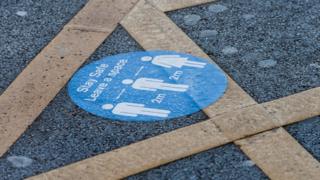
[ad_1]

Image copyright
Getty Images
New measures have been deployed on board trains and at stations amid fears that more people might use public transport to return to work this week.
Security guards with crowd management training will be at some stations.
Passengers could be prevented from boarding a train or entering a platform if there are already too many people.
From Monday morning there will be more services as the railways move from a Sunday-style timetable to something similar to that of a normal Saturday.
Ministers say it is vital that people do not use public transport unless their journey is essential and they have no alternative.
But some rail bosses have expressed concerns that social distancing will not be possible on trains or platforms.
Reservation only
And more radical steps, such as such as requiring passengers to book time slots for when they can arrive at a station, are being considered.
Train operators are already planning to limit numbers boarding specific services.
Many intercity trains will be reservation only and Avanti West Coast has said it would not allow carriages to be more than a third full.
Some train companies will block-off seats to ensure that passengers spread-out. It is also possible that if a service becomes relatively busy early on, then the train will not stop at other destinations along its route.
In future, train operators might not open the doors of certain carriages at earlier stations along a route so that people can get on at a later stop and still have the necessary space to keep their distance.
One-way systems are already in place at stations, such as Clapham Junction in South West London, to ensure that social distancing is possible.
The chairman of Network Rail, Sir Peter Hendy, was asked by the government to create a plan for managing the flow of passengers.
Stations have been reorganised, signs have been installed and space could be made outside for queuing in case entrances and exits are closed.
Sir Peter, who is one of the most respected and experienced figures in the railways, said he was “confident” that enough work had been done prior to Monday’s increase in services, so that stations “were in a better place”.
Currently, only people who cannot work from home are advised to return to their workplace.
Employers had a vital role to play, said Sir Peter, because they can “strongly influence people’s behaviour”.
“You wouldn’t set-out for work if someone told you not to come,” he said.
Transport for London has spoken to around 300 businesses and the Transport Secretary Grant Shapps has indicated that office start times will be staggered to manage demand on public transport. Meanwhile, London’s congestion charge, which was suspended in March, will be reintroduced on Monday.
Image copyright
Getty Images
The central message from the government is that people should avoid public transport if they can.
People are also being encouraged to cover their face when on board a train or at a station when it is crowded.
However, senior figures from the rail industry insist they will not be policing whether people are following government guidelines. One rail source said the industry had “done everything we can to suppress demand.”
Passenger numbers last week were slightly up on the previous week. However, footfall through major UK stations was only about 10% of pre-pandemic levels.
During the crisis the government is covering the losses made by train companies, which saw revenues evaporate when travel restrictions began.
But industry forecasting predicts that significant passenger numbers will return several weeks from now.
Train companies admit they are nervous about how the situation can be managed, once crowds return. “We are counting on the individual conduct of passengers”, said one rail source.
“When we say essential journeys only we really mean it.”
Mick Cash, the general secretary of transport union RMT, said: “When people absolutely must use a train, there should be new compulsory protections.”
“We have the crazy situation of Eurostar passengers arriving with masks on into St Pancras but then not wearing masks when they transfer to the tube or other rail services.”
[ad_2]
Source link